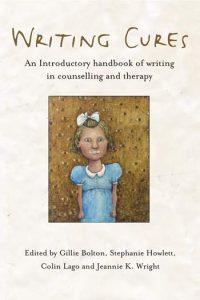An Introductory Handbook of Writing in Counselling and Psychotherapy
Routledge Publishers
2004
Editors:
Dr Gillie Bolton
Dr Jeannie K. Wright
Stephanie Howlett
Colin Lago
Contributors: Heather Allen, Kate Anthony, Gillie Bolton, Jaquie Daniels, Helen Drucquer, Colin Feltham, Stephen Goss, Lin Griffiths, Lisa Heller, John Hilsdon, Stephanie Howlett, Celia Hunt, Colin Lago, Robert Langdon, John Latham, Geoff Lowe, Anthony Ryle, Jane Speedy, Derek Steinberg, Kate Thompson, Claire Williamson, Jeannie K. Wright.
The helping professions are increasingly harnessing the arts and humanities to broaden clinical understandings of the human condition. Yet writing has not been widely recognised in counselling and therapy circles. Writing Cures demonstrates the power of expressive and reflective writing in the context of therapy, whether online or text-based, enabling the practitioner to undertake healing writing methods with clients.
Covering a range of contexts such as workplace and student counselling and therapy in medical settings, Writing Cures draws together a comprehensive view of cross-disciplinary research and practitioner reports. An impressive list of contributors cover subjects including:
- Ethical and practical dimensions of online writing
- Writing by patients and therapists in cognitive and analytic therapy
- Writing for professional development and reflective practice
Illustrated throughout by examples from clinical experience Writing Cures will be of benefit to all counsellors, psychotherapists and clinical psychologists who want to use writing confidently with their clients.
Endorsement of Writing Cures
The use of writing as a medium for therapeutic work has received increasing attention in recent years. The editors of Writing Cures have brought together a wide-ranging collection of chapters that reflect the energy, creativity and diversity of this field at the present time. Their Handbook is comprehensive, in encompassing different therapeutic approaches, including psychodynamic, cognitive-behavioural, cognitive analytic and narrative therapies, and a rich variety of modes of writing, such as letters, emails, poems and diaries.
Critical issues are examined, for instance around the ethical basis of counselling on the internet. This is a book that is consistently stimulating and informative: the reader is able to make connections between ideas and methods introduced in different chapters, and readily able to envisage ways in which the use of writing might be integrated into their own therapeutic practice.
John McLeod, University of Abertay, Dundee
Buy here
ISBN: hb 1-58391-911–2; pb 1-58391-912–0


